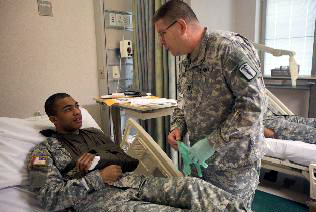
SEOUL, South Korea (BP)–Chaplain (CPT) Roger Hall understands what it’s like to be an enlisted soldier. Hall began his military career as a private. He moved up through the ranks to master sergeant, and while serving in this capacity he began attending seminary. After graduation, Hall transitioned from a non-commissioned officer into the U.S. Army chaplaincy program.
Now, as a chaplain stationed at the 121st Combat Support Hospital on the Yongsan Army Post in Seoul, Korea, Hall provides pastoral care to young soldiers and their families seeking medical treatment.
Although the 121st may be best known for its combat support role in the Korean War and popularized by the 1970s television series “M.A.S.H.,” it is now classified by the U.S. Army as a Medical Department Activity, providing treatment to soldiers and their families stationed on the Korean peninsula.
“As a combat support hospital providing armistice health care, the hospital always had to be ready to provide wartime services,” Hall said. “Now that we have transitioned from combat support to a peacetime mission, we are beginning to provide a wider variety of services.”
The facility now includes an alcohol treatment center and inpatient psychiatric care. While it no longer receives soldiers directly from the battlefield, it continues to minister to those affected by battle in less violent, more subtle ways.
Many of the soldiers now stationed in Korea have served at least one tour of duty in Iraq or Afghanistan, Hall noted. When they arrive in Korea, they continue to be haunted by the images of war. As a result, Hall said, the most common issues he has witnessed among veterans of the global war on terror have been alcoholism, post-traumatic stress disorder (PTSD) and family violence.
To combat these problems, Hall has worked with his commanders to establish a support group for veterans, linking them as needed to mental health and social service professionals.
Hall also recognizes the importance of addressing the spiritual aspects of PTSD with the soldiers.
“First of all,” Hall said, “they are angry with God. Then, many of them suffer from the guilt of surviving when their buddies did not.”
These guilt feelings often turn to anger which may lead to self-medication or alcohol abuse which is often followed by family violence, Hall said, noting, “It’s a cascading effect.”
“While soldiers are rarely deployed from Korea,” Chaplain (COL) Kenneth Kerr explained, “many come to Korea from deployment.” Kerr described the chaplains of the 121st as “part of the team that is here to provide strength and wholeness to soldiers dealing with deployment issues.”
In spite of the challenges, though, Hall continues to see God at work. He’s seen families on the verge of separation restored and minor medical miracles in which healing occurred when it appeared that surgery would be required.
“They appear to be simple things, really,” Hall said, “but I can see God’s hand.”
Hall credits all this to the power of prayer. In fact, he believes so strongly in prayer that he has established a 24-hour prayer room at the hospital, which he says is well-utilized. “I’m not sure why it hasn’t been done before now,” he said.
The soldiers to whom Hall ministers in Korea includes those serving their first tour of duty in the Army. Because they have not yet seen combat, they don’t always understand the dangers. Thus, Hall seeks to prepare young soldiers for the realities they may face on the battlefield one day.
Hall believes this is best done by getting the Word of God into the hands, hearts and minds of these young soldiers. One way he’s accomplishing this is through his “spiritually fit, not physically fat” initiative. Hall encourages the soldiers to stop by his office and talk with him by offering them a piece of candy. “The first piece of candy is free,” Hall said, “but to get the second piece of candy, the soldiers need to recite the Bible verse of the day.
“It seems to be working,” he said.
Hall also is trying to place Bibles in every room in the hospital, but this has been a struggle since the hospital recently opened a new wing –- and tightening budgets ended Hall’s ability to purchase additional Bibles this year.
Hall acknowledged that he would gratefully accept Bibles, evangelistic tracts, videos and any other Christian materials.
“We absolutely need all the Bibles and Christian materials we can get,” Hall said. “I want to get the Word of God to as many soldiers and their families as I can.”
Individuals interested in providing Bibles or other Christian materials to Hall and other Southern Baptist chaplains in Korea can send them to:
CH (COL) Kenneth Kerr
EUSA Command Chaplain
PSC 303, Box 82
APO, AP 96204
–30–
Ann Lovell is a media worker based in Seoul, South Korea, with the Southern Baptist International Mission Board.
















